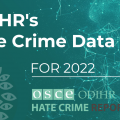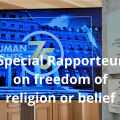4th March 2024 By Author : CAP Liberté de Conscience
At a time when the fabric of global society is increasingly strained by divisions, the report on hatred based on religion or belief by Nazila Ghanea, the Special Rapporteur on freedom of religion or belief, emerges as a beacon of insight and guidance. This comprehensive document, to be presented at the 55th session of the Human Rights Council, not only examines the diverse manifestations of religious hatred, but also proposes a way forward for nations and societies grappling with this pervasive problem.
A deep dive into the heart of hate
Drawing on a rich tapestry of sources, including submissions from 24 States, civil society organisations and individual contributions, Ghanea’s report meticulously dissects the nature, causes and effects of religious hatred. It shows how such hatred, often simmering beneath the surface of societal discourse, can erupt into forms of discrimination and violence that undermine the very principles of human dignity and coexistence.
The psychological toll and beyond
One of the report’s critical revelations is the profound psychological harm caused by exposure to hate speech, which has been identified as a significant public health concern. This aspect of religious hatred, which can escalate into physical violence and systemic discrimination, underscores the urgency of addressing the issue not just as a matter of legal compliance, but as a societal imperative.
A call to action for states and civil society
Ghanea’s recommendations go beyond the conventional boundaries of legal reform, urging states and non-state actors alike to take a proactive stance against religious hatred. The report advocates a human rights-compliant approach to regulating hate speech and stresses the importance of promoting interfaith and intercultural dialogue. It also highlights the role of transnational advocacy networks in maintaining vigilance against the spread of religious hatred.
Navigating the legal landscape with the Rabat Action Plan
A cornerstone of the report is its reliance on the Rabat Plan of Action as a framework for distinguishing between hate speech that warrants criminal sanctions and speech that, while harmful, falls within the ambit of protected speech. This nuanced approach is essential to ensure that efforts to combat religious hatred do not inadvertently stifle freedom of expression.
The political economy of hate
Ghanea’s analysis extends to the political and economic dimensions of religious hatred, showing how it is often exploited to justify restrictions on freedoms and to marginalise religious and belief minorities. This perspective sheds light on the complex interplay between religious hatred and broader societal issues such as political power dynamics and economic inequality.
Towards a transformative approach
The report calls for a transformative approach to tackling religious hatred, one that addresses its root causes and promotes substantive equality. By advocating a shift in focus from reactive measures to proactive engagement with cultural and structural factors, Ghanea sets out a vision for a more inclusive and tolerant world.
Conclusion
As the 55th session of the Human Rights Council awaits the presentation of this pivotal report, the international community stands at a crossroads. The path laid out by Nazila Ghanea offers a roadmap for addressing the challenges of religious hatred, with the promise of a future where freedom of religion or belief is protected for all. By embracing this comprehensive approach, states, civil society and individuals can work together to break down the barriers of hatred that divide us.





